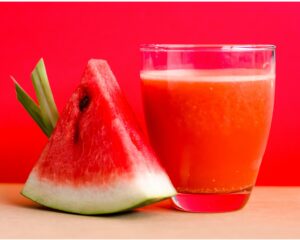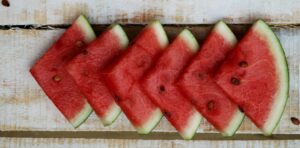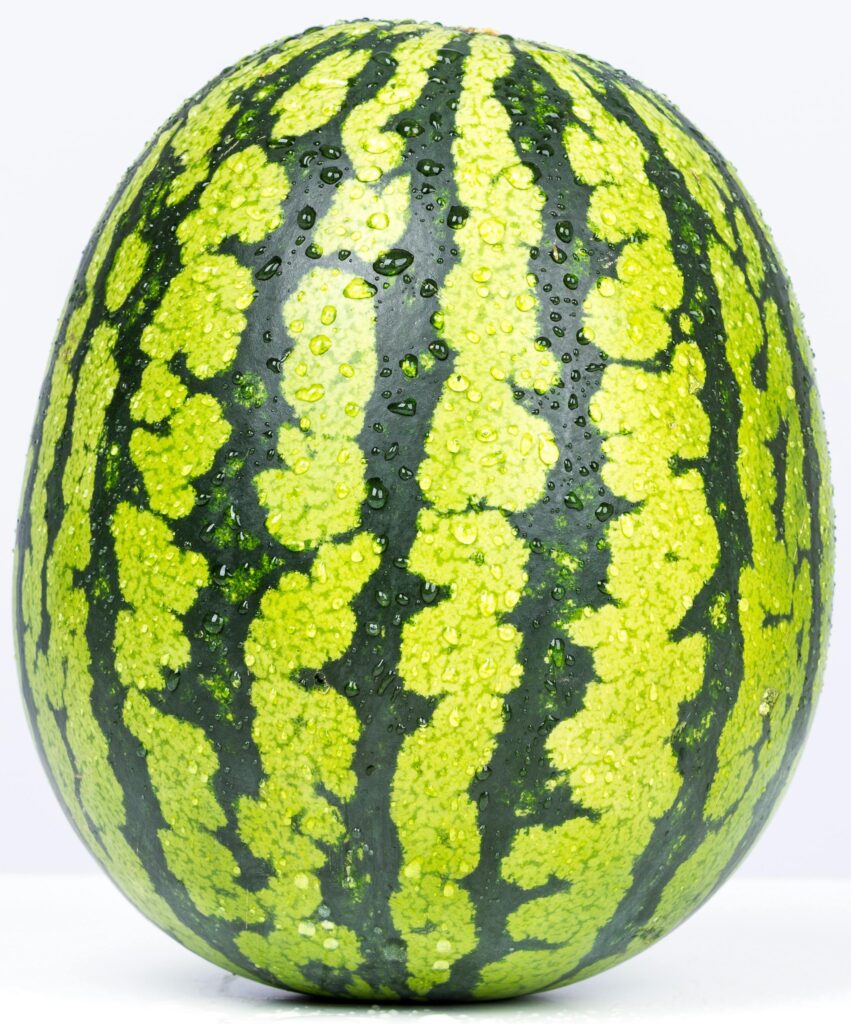When it comes to weight loss, finding satisfying foods low in calories can feel like discovering a hidden treasure. One such gem is watermelon. This juicy, sweet fruit isn’t just a summertime treat; it’s also a powerhouse for supporting your weight loss goals. The best part is that you can find watermelon in almost every part of the world. This blog post explores six incredible benefits of watermelon for weight loss, delves into the popular 3-day Watermelon Diet, discusses the best time to eat watermelon, and answers the burning question: “Does watermelon help you lose belly fat?”
6 Benefits of Watermelon for Weight Loss
1. Low in Calories but High in Nutrients
One of the most significant advantages of watermelon for weight loss is its low-calorie content. With only about 30 calories per 100 grams, watermelon allows you to indulge in a satisfying snack without worrying about overloading on calories. But don’t let its low-calorie count deceive you because watermelon is loaded with essential nutrients.
- Vitamins and Minerals: Watermelon is rich in vitamins A, C, and B6, which are crucial for maintaining skin health, boosting the immune system, and providing energy.
- Hydration Hero: With about 92% water content, watermelon helps keep you hydrated, essential for overall health. It can also aid in weight loss by helping you feel full.
- Antioxidants: Watermelon is loaded with antioxidants like lycopene, which may protect your cells from damage and reduce inflammation.
Combining these nutrients means you can enjoy watermelon guilt-free, knowing you’re fueling your body with good-for-you ingredients that support your weight-loss efforts.
2. Satisfies Your Sweet Tooth Naturally
Cravings for sweets can be one of the biggest hurdles when trying to lose weight (that was my biggest challenge😊). Instead of reaching for high-calorie desserts, watermelon can be your go-to natural sweet fix. Its naturally sweet flavor can satisfy your sugar cravings without the added calories and refined sugars of many processed treats.
- Glycemic Index: Watermelon has a glycemic index (GI) of about 72, which might seem high, but its glycemic load (GL) is relatively low due to its high water content, which means it’s unlikely to cause a significant spike in blood sugar levels, making it a safer option for those watching their sugar intake.
By choosing watermelon over sugary snacks, you can enjoy a sweet treat that won’t derail your diet while benefiting from the fruit’s natural goodness.
3. Helps You Stay Full Longer
One key to successful weight loss is feeling satisfied after meals- it helps prevent overeating and snacking between meals. Watermelon’s high water content is crucial in helping you feel full.
- Water Content: Watermelon water occupies space in your stomach, helping you feel satisfied without the added calories.
- Fiber: Although watermelon isn’t exceptionally high in fiber, it does contain some, adding bulk to your diet and enhancing the feeling of fullness.
Incorporating watermelon into your meals or enjoying it as a snack can help quench hunger and reduce the urge to reach for less healthy options.
4. Boosts Metabolism
Watermelon contains citrulline- an amino acid connected to various health benefits, including boosting metabolism. Citrulline converts into arginine in the body, an amino acid that may promote fat loss.
- Fat Burning: Some studies suggest that citrulline can help improve the body’s ability to burn fat by increasing the rate at which it converts fat into energy. This process can support overall weight loss efforts.
Exercise Performance: Citrulline may also enhance exercise performance by reducing fatigue and improving blood flow. This allows you to work out harder and longer, which helps you lose weight in return.
Regular consumption of watermelon can boost your metabolism and enhance your weight loss journey.
5. Supports Muscle Recovery
Sticking to a regular exercise routine is a critical component of any weight loss plan, and proper recovery is just as important as the workouts themselves. Thanks to its nutrient profile, watermelon can aid in muscle recovery.
- Citrulline: As mentioned earlier, citrulline in watermelon can help reduce muscle soreness after exercise by improving blood flow and oxygen delivery to muscles.
- Electrolytes: Watermelon is a good source of potassium, an essential electrolyte that helps maintain fluid balance, prevent muscle cramps, and support overall muscle function.
Including watermelon in your post-workout snack can help your muscles recover faster, allowing you to stay on track with your fitness goals.
6. Acts as a Natural Diuretic
Water retention can make you feel bloated and heavier than you really are, which can be discouraging when trying to lose weight. Watermelon acts as a natural diuretic, helping to reduce water retention and flush out excess fluids from your body.
- Hydration and Detoxification: Watermelon’s high water content encourages urination, which helps eliminate toxins and excess salt from the body. This process can reduce bloating and help you feel lighter.
- Kidney Health: Regular consumption of watermelon can also support kidney health by promoting cleansing, reducing the risk of kidney stones, and improving overall kidney function.
Incorporating watermelon into your diet can help you manage water retention, making you feel more comfortable and confident in your weight loss journey.
What is the 3-Day Watermelon Diet?

The 3-day Watermelon Diet is a popular short-term diet plan that promises quick weight loss by consuming primarily watermelon over three days. This diet is a detox or cleanse aimed at flushing out toxins from the body while shedding a few pounds.
How It Works:
- Day 1: On the first day, you eat only watermelon. The idea is to consume enough watermelon to feel full, which can be around 1-1.5 kg per meal. There’s no strict limit on how much watermelon you can eat, but the key is to eat until satisfied.
- Day 2: On the second day, you can introduce other fruits and vegetables into your diet. Continue eating watermelon as the main component, but feel free to add salads or other light, low-calorie foods.
- Day 3: On the final day, you reintroduce more solid foods, such as whole grains, lean protein, and vegetables. Watermelon remains vital to your meals, but the focus shifts to a more balanced diet.
Pros and Cons:
- Pros: The 3-day Watermelon Diet is low in calories, rich in hydration, and easy to follow. It can lead to rapid weight loss, primarily due to water weight and reduced calorie intake.
- Cons: This diet is not nutritionally balanced; it lacks protein, fats, and other essential nutrients. The weight loss achieved is likely temporary, and there’s a risk of gaining the weight back once regular eating habits resume.
The 3-day Watermelon Diet can be a fun and refreshing way to kickstart weight loss, but this should be followed with caution rather than as a long-term solution. If you have health issues, please consult with your healthcare provider before embarking on this diet.
What is the Best Time to Eat Watermelon?

Timing your watermelon consumption can affect how effectively it supports weight loss efforts.
Morning:
Eating watermelon in the morning can be an excellent way to start your day. The natural sugars boost energy, while the hydration helps kickstart your metabolism. It’s also light on the stomach, making it an ideal breakfast or morning snack choice.
Pre-Workout:
Watermelon can be a great pre-workout snack. The citrulline content can improve exercise performance, while the water and natural sugars provide hydration and energy. Eating watermelon about 30 minutes before your workout can help fuel your exercise session.
Post-Workout:
After a workout, your body needs to replenish lost fluids and nutrients. Watermelon is perfect for this, as it provides hydration, electrolytes, and the necessary citrulline for muscle recovery. Enjoying a bowl of watermelon post-workout can help your body recover and reduce muscle soreness.
Evening:
While watermelon is light and easy to digest, it’s best to avoid eating large quantities late at night. The high water content might lead to frequent trips to the bathroom, disrupting your sleep. If you crave something sweet in the evening, a small portion of watermelon is ideal, but try having it earlier in the evening.
Does Watermelon Help You Lose Belly Fat?
When targeting belly fat, it’s essential to understand that no single food can magically remove fat from a specific area. However, watermelon can support your overall weight loss efforts, which may include reducing belly fat.
Caloric Deficit:
Watermelon’s low-calorie content can help you maintain a caloric deficit necessary for fat loss. By substituting higher-calorie snacks with watermelon, you can reduce your overall calorie intake, contributing to losing belly fat over time.
Hydration:
Proper hydration is crucial for weight loss and reducing belly fat. Dehydration can lead to bloating and water retention, making your belly appear larger. The high water content in watermelon helps keep you hydrated and may reduce bloating, giving your belly a flatter appearance.
Metabolism and Fat Burning:
As mentioned earlier, the citrulline in watermelon may help boost metabolism and promote fat burning. While watermelon alone won’t specifically target belly fat, incorporating it into a balanced diet and active lifestyle can support overall fat loss, including from the abdominal area.
Final Thoughts
Now you know watermelon is not just a refreshing summer fruit; it’s a great friend in your weight loss journey. From being low in calories yet high in essential nutrients to satisfying your sweet tooth without added sugars, watermelon offers multiple benefits that support your efforts to shed pounds. Its ability to keep you feeling full, boost metabolism, aid in muscle recovery, and act as a natural diuretic makes it a powerful tool in your weight loss arsenal.
While the 3-day Watermelon Diet might provide a quick start, it’s essential to remember that viable weight loss comes from a balanced diet and regular exercise. Incorporating watermelon into your meals—whether for breakfast, pre- or post-workout snacks, or as a hydrating treat on a hot day—can help you stay on track and reach your goals.
While watermelon alone won’t specifically target belly fat, it can play a part in a general reduction in body fat when combined with a healthy lifestyle. So, don’t hesitate to pick up a watermelon next time you’re at the grocery store. Your body—and your taste buds—will thank you!
Remember, weight loss is a journey, not a destination. Enjoy the process, make healthy choices, and savor the sweet, juicy goodness of watermelon along the way.



1 thought on “Watermelon Benefits for Weight Loss: A Sweet Journey to Shedding Pounds”
Great article! I drink watermelon juice as a quick electrolyte after a good workout, it’s so refreshing as it gives the sugar boost I need. I also love to make watermelon popsicles in the summer.